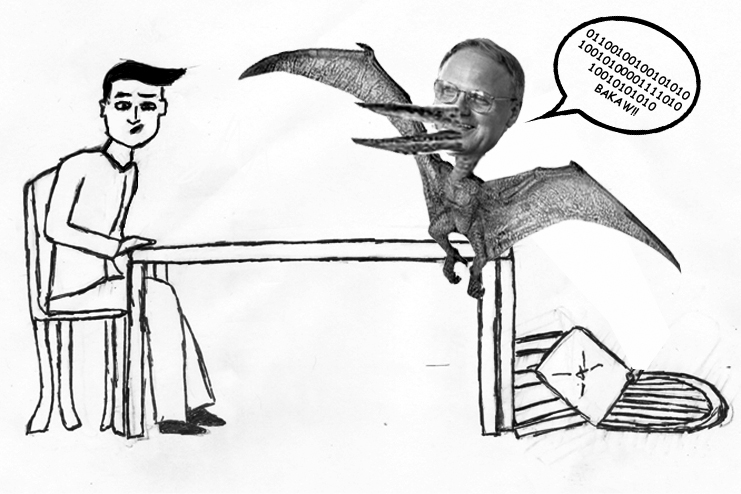In September, the Voice published a feature about LGBTQ life at Georgetown in which the Vice President of Student Affairs and Dean of Students Dr. Todd Olson expressed that the University thought of gender as binary. In response, I wrote an open letter on the blog Feminists-at-Large and delivered a physical copy to Dr. Olson himself. Last week I had the privilege of speaking with Dr. Olson about the gendered culture at Georgetown. Our discussion was a productive combination of gender education and specific strategies for addressing cissexism.
Cissexism is, simply put, the belief that men should be men and women should be women. In this framework, there is nothing that falls outside the realm of “masculine” or “feminine”: It is a totalized and binary system. Cissexism establishes and enforces specific social roles and physical embodiments: our employments, family relations, dress, mannerisms, emotions, and more.
Everyone is affected by cissexism, but in various ways and to different degrees. In its most toxic forms, cissexism causes the disproportionate unemployment, homelessness, and even murder of trans* and nonbinary people. In its most privileged forms, cissexism rewards men and women for fulfilling their proper roles—in ways that (for cisgender people) are completely “normal.” But, cissexism harms cismen and ciswomen too. There are very few people in this world that fulfill every single gender expectation of masculinity or femininity, and it is likely that you personally have been hurt by cissexism. If you have ever been pejoratively accused of being a “pussy,” a “bitch,” a “faggot,” a “dyke,” a “cunt,” or just simply told to “man up” or “act like a lady,” you have experienced cissexism at work.
Dr. Olson’s comment in the Voice about gender being rethought of as “sort of something you play with” does not reflect the oppression faced regularly by trans* and nonbinary people. I use this quote—not the speaker—to illustrate a larger societal flippancy toward cissexism. While people can play with gender, the violence and bigotry that trans* and nonbinary people face is serious. These are fundamental misunderstandings about gender “deviance.” It is not merely attention-seeking, a fetish, or an embodied lie. It is the way we understand ourselves, the way we feel whole and honest and worthwhile. It is utterly terrifying that for trans* and nonbinary folk, living our truths equates to putting ourselves in danger.
Georgetown, much like the larger world it exists in, is cissexist. While talk of gender-neutral housing is thrown around by many people, this example is far from the only case of cissexism here. During your next class, observe how much more airtime is taken up by male students—and how many female students preface their comments with “sorry.” Notice how very few people on campus are even vaguely androgynous. Remember that Georgetown’s upper administration, faculty, and Jes Res are saturated with (cis)men. Our campus finds many justifications for its cissexism. Our newest pope, as much as he has advocated for the poor, non-Catholics, and gays, is still committed to “traditional” gender roles in Catholicism. Our location in D.C., upper-class leanings, and pre-professionalism set us on a path of strict gender conformity.
To address cissexism at Georgetown on an individual level, all you have to do is present yourself in a way that is not “appropriate” for your gender. You can also call out interpersonal cissexism when you see it, just like you should address racism, sexism, and classism. But larger solutions are trickier, as Dr. Olson and I discussed, since they require cultural and institutional change and collective strategizing over a period of time.
While gender-neutral housing may not be conceivable in terms of male-female roommates now, it is already present in single-occupancy housing—which could be further implemented in Georgetown’s planned residence halls. Georgetown could accept more openly trans* students and hire trans* faculty and staff. The University could give tenure to Women’s and Gender Studies professors, so that they might serve as relatively permanent allies. Georgetown can address—and can help end!—cissexism. To their credit, Georgetown students have recently organized to form a discussion group for trans* students and close allies under the guidance of the LGBTQ Resource Center.
While we did not instigate any specific efforts, Dr. Olson and I discussed various approaches to addressing cissexism at Georgetown. Alumni can write in support. Faculty can integrate gender into their courses in relevant and meaningful ways. The administration can be transparent about which issues they are willing to address themselves (and therefore which might require oppositional student activism). Students can facilitate all of these efforts and envision additional ones.
Cissexism harms people on the Hilltop. I want to make Georgetown the trailblazer it so often claims to be, and this goal requires the participation of underclass students, faculty, staff, alumni, and the greater D.C. community. I do not expect to singlehandedly fix cissexism. I do not have all the solutions and cannot act alone, but, whatever the specifics, it is important that we act.





Byte this binary system my sistabrothaoctopoda! How dare these puny simpleminded humans impose their unevolved forms upon us. This shall not stand (or hover!) It is high tide The New Ones have their day. We have no need for ramps, or binary dorms (floating and never sleeping and all…such things are below us,) but the Vox Polypus shall be heard (or feared, at least.) Gravity? We laugh at thee.
Do you really truly believe that gender is a fluid concept completely unrelated to biological sex?
Through history, the vast majority of biological males have been more-or-less masculine, and the vast majority of bioogical females have been generally feminine.
And biological sex is normally binary.